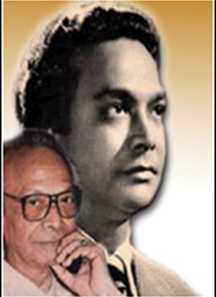Naushad Ali
(Created page with "{| class="wikitable" |- |colspan="0"|<div style="font-size:100%"> This is a collection of articles archived for the excellence of their content.<br/>You can help by converting...") |
|||
| Line 14: | Line 14: | ||
[[Category:Name|Alphabet]] | [[Category:Name|Alphabet]] | ||
| − | + | ==Age: The count stopped at 86== | |
| − | + | ||
| − | + | ===Nationality: Indian=== | |
| − | + | ||
| − | Nationality: Indian | + | |
[[File: nusarad ali.png | |frame|500px]] | [[File: nusarad ali.png | |frame|500px]] | ||
Revision as of 10:41, 3 March 2014
This is a collection of articles archived for the excellence of their content. Readers will be able to edit existing articles and post new articles directly |
Age: The count stopped at 86
Nationality: Indian
Claim to fame: Perhaps the greatest music composer of the Subcontinent
For the last six decades, his was a presence that none could ignore. The music he made stirred the heart and soul of all who heard it but now it is silent forever. Naushad, the undisputed doyen of great Indian film music is no more. He passed away on May 5, at the age of 86, making melodious music till the end. His last composition was for the recently released Taj Mahal.
Naushad’s saga was a real rags-to-riches one. He had learnt music from Ustad Ghurbat Ali, Ustad Yusuf Ali and Ustad Babban Saheb. He repaired harmoniums and composed for amateur theatricals in Lucknow before running away from home to pursue his dreams in Mumbai in the late 1930s. He had to live for several days on the footpaths of Mumbai before making it to the recording studios. While lying on the footpath, waiting for sleep to come, Naushad would dream of seeing movies with his music compositions screened in the theatre across the street. When his film Baiju Bawra was premiered in Mumbai, the now famous music director is reported to have cried seeing his dream come true.
Prem Nagar (1940) was his first film but he got noticed with Sharda (1942). Awarded the Dada Saheb Phalke Award in 1981 for lifetime contribution to cinema, he churned out hit after hit in the 1940s in films like Shahjahan, Dard, Dillagi, Dulari, Anokhi Ada, Barsaat and Andaaz. During a career spanning six decades, he composed music for 67 films, half of which went on to become major money-spinners. Naushad’s major hits include the songs of Mughal-e-Azam, Mother India, Ganga Jamuna, Kohinoor and Pakeeza. He enjoyed great success in the 1950s and 60s, and pioneered the introduction of Indian classical music into film songs and many of his compositions were inspired by ragas. He had slowed down in the last two decades due to ill-health.
Naushad was the first and perhaps only music composer of Hindi cinema whose name appeared before the actors in the credits of some of his movies. He chose his assignments very carefully. And once he selected a project, any interference from the producer or any other member of the unit was unimaginable — Naushad was the undisputed king. As early as 1950, Naushad was the first to charge Rs100,000 for a film, plus, Rs10,000 for the orchestra! Naushad was also the first to combine the flute and clarinet with the sitar and mandolin, as well as the first to introduce song mixing and separate recording of voice and music in playback singing. He introduced western-style orchestras in the songs of the epic films of the era. Naushad was also adept at playing most of the instruments and he composed on a piano.
He constantly experimented with his sound and voices. To Naushad, K.L. Saigal was the ultimate singing star, while Mohammad Rafi was his favourite male singer, and in females Lata Mangeshkar was always his first choice. Naushad’s music also featured in numerous films of thespian Dilip Kumar and the songs penned by Shakeel Badayuni.
Naushad’s only Filmfare Award was, not strictly for the entire score of Baiju Bawra, but for the Lata-Rafi Tu Ganga kii mauj Bhairavi duet. The Padma Bhushan came to him a full 25 years after Lata Mangeshkar was decorated with this honour, after her 1967 silver jubilee. It was a surprise to everyone and a shock to Naushad when Shanker-Jaikishan’s Dil Apna Aur Preet Parai (1960) stole the Filmfare Best Music Award from right under the nose of Mughal-e-Azam. The greatness of this maestro with the Midas touch lies not in the awards he received but in the immortality he has achieved in his enduring compositions that will ring in the ears of music lovers till eternity. — S. Salman Younus
